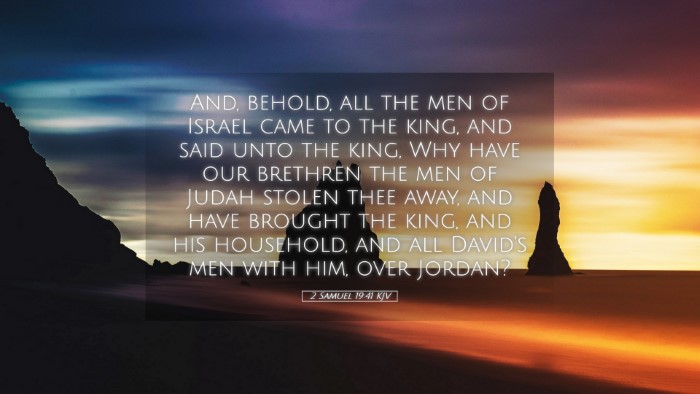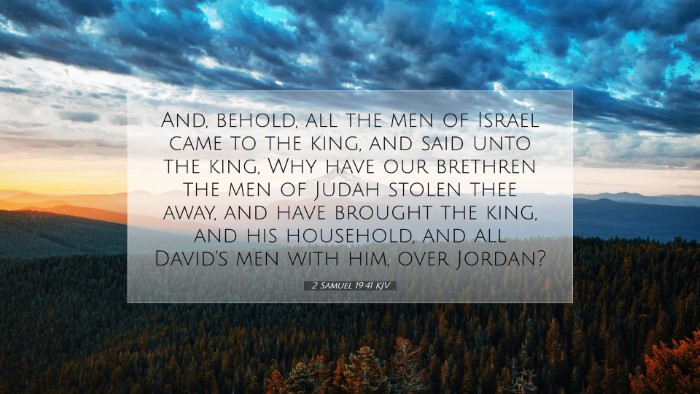Commentary on 2 Samuel 19:41
The verse states: "And, behold, all the men of Israel came to the king, and said unto the king, Why have our brethren the men of Judah stolen thee away, and have brought the king and his household over Jordan, and all David's men with him?"
Contextual Overview
2 Samuel 19 marks a pivotal moment in David's reign following Absalom's rebellion. This passage illustrates the tension between the tribes of Israel, specifically between Judah and the other tribes, concerning the restoration of King David. The commentary here explores the nuances of tribal loyalty, political maneuvering, and the emotional landscape of a nation grappling with division and reconciliation.
The Arrival of the Men of Israel
The men's arrival signifies a collective response and perhaps a sense of desperation. Matthew Henry outlines that the men of Israel, upon hearing of David’s return, felt both anger and confusion towards the men of Judah. Their accusation reveals underlying tribal rivalries that are not just personal but deeply rooted in the social fabric of Israel.
- Interaction of Tribes: This verse reflects the complicated relationship between the northern tribes of Israel and the southern tribe of Judah. The men of Israel perceived Judah's actions as a betrayal.
- Political Rivalry: Barnes emphasizes the political dimension of their response, highlighting that jealousy and rivalry fueled their grievances against Judah.
Accusation Analysis
The phrase "stolen thee away" captures both the emotional and perceived injustice felt by the men of Israel. Clarke draws attention to the rhetorical nature of their question, which serves to express their indignation rather than seek a factual answer.
Implications of Division
These remarks unveil the fractures within the nation. The society was not just mourning a disgraced king but navigating the complexities of allegiance and identity. These sentiments echo through the ages when political intrigue interfaces with familial and tribal loyalties.
- Fragmentation of Unity: The varied responses highlight that Israel was not a unified body but a federation of tribes, each with its unique interests.
- The Role of Leadership: David’s leadership is called into question, as these divisions could be perceived as a failure to unite the people. Henry notes that this failure may stem from David's earlier decisions during Absalom's insurrection.
Divine Providence and Human Agency
Through this conflict, we see the interplay of divine providence and human actions. The fidelity of Judah and the discontent of Israel both serve a greater narrative within God's plan for David's kingship. Comments from both Barnes and Clarke allude to God's sovereignty as a guiding force amidst human failure.
Reflective Questions for Leaders
For pastors and theologians, this passage may serve as a poignant reminder of the importance of fostering unity within their congregations against the backdrop of human fallibility.
- How can leaders bridge divides in their communities?
- What does this account teach us about conflict resolution?
- In what ways does this reflect on God’s providential hand in governance?
Conclusion
The tension encapsulated in 2 Samuel 19:41 serves as a timeless reflection on human nature, tribalism, and the complexities of leadership in a divided community. Just as David navigated the challenges of his time, so too must contemporary leaders strive for unity, understanding, and grace in the face of division. Utilizing the insights from historical commentaries deepens our understanding and appreciation of this biblical narrative.


